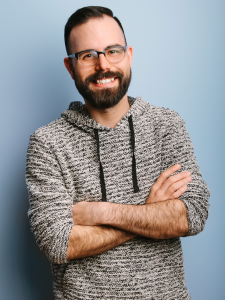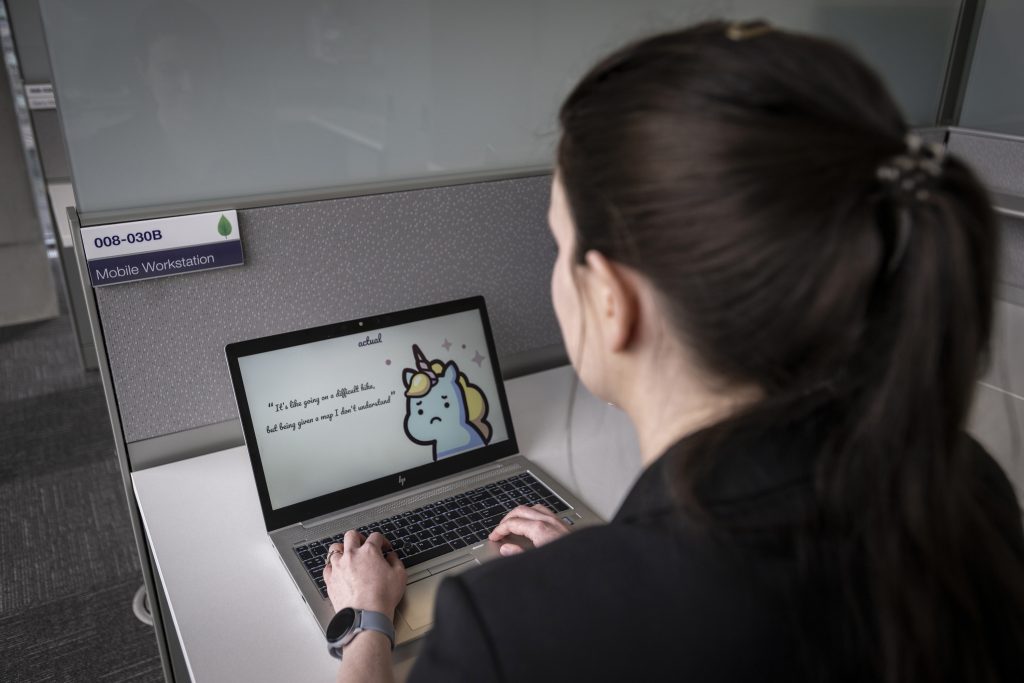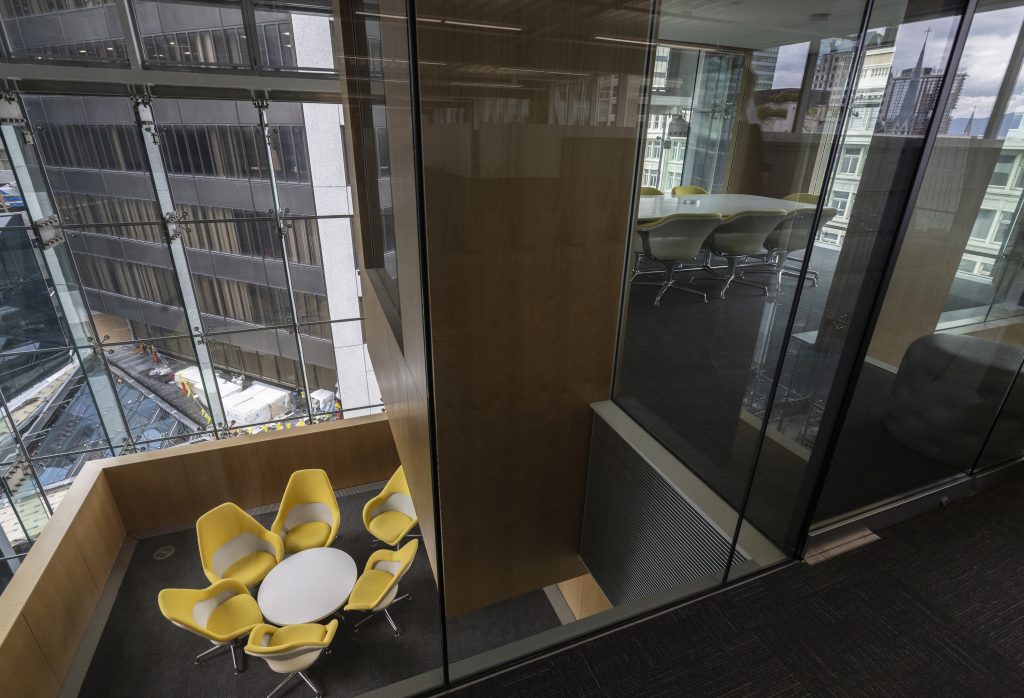
With GitHub, Canadian company TELUS aims to bring ‘focus, flow and joy’ to developers
Katie Peters could have used an advocate as she embarked on her tech career.
In her first year at the University of British Columbia, Peters’ computer science classes were split almost evenly along gender lines. But most of her female classmates soon switched majors, and by Peters’ final year there were typically only two or three women in those classes. She felt increasingly isolated and was uncomfortable asking for help.
After graduating with a computer science degree in 2012, Peters took a job as a software developer for TELUS, a Canadian telecommunications company. Joining an organization with more than 90,000 employees, Peters initially found it challenging to make her way around its procedures and structure. So when the position of staff developer opened on TELUS’ new engineering productivity team last fall, Peters jumped at the opportunity.
“I wanted to be the person that I wish could have helped me,” says Peters, who started in the role last October. “There are so many complicated processes in a company as large as TELUS and it’s really difficult to navigate. You end up feeling stupid a lot of the time and you have to ask lots of questions. I don’t want other people to have to experience that. I want to make that better.”

Peters is ‘a brilliant developer and a brilliant technologist,’ says Justin Watts, head of TELUS’ engineering productivity team.
Peters is now helping lead an initiative aimed at changing TELUS’ culture to better empower its developers. Much of that effort is focused on encouraging widespread adoption of Microsoft’s code-hosting platform GitHub to help automate software development at TELUS and make it easier for the company’s roughly 4,000 developers to collaborate. TELUS recently made GitHub available companywide and signed an agreement with Microsoft to help manage its enterprise-level use of the platform and provide GitHub training to developers.
Justin Watts, head of developer experience for TELUS, says Peters’ experience as both a developer and a previous member of TELUS’ enterprise architecture team makes her ideally suited to help redefine the company’s approach to software development.
“This is all being driven by Katie and the vision she has,” says Watts, who heads the engineering productivity team. “Katie is great at capturing that relationship with the developer and what our goals are. She is a brilliant developer and a brilliant technologist.
“She’s seen as a really senior, influential mind in the company.”

Justin Watts.
Peters is already shaking things up. Drawing inspiration from “The Unicorn Project,” a 2019 novel by Gene Kim about a group of renegade developers seeking to overthrow the existing order and make work more fulfilling, Peters has replaced the usual staid presentation decks with ones featuring swirling designs, pink and purple tones and cartoon unicorns, and adopted the book’s mantra of bringing “focus, flow and joy” to developers.
Transform recently chatted with Peters over Microsoft Teams from her home in Vancouver, where she lives with her husband and 2-year-old daughter. The interview has been condensed for clarity and length.
TRANSFORM: Why was the engineering productivity team formed and what is its mission?
PETERS: We’ve been transitioning to the cloud for software development for a while, but it’s challenging. It greatly simplifies very complicated operations activities and turns those things into code. So instead of needing an ops professional to manually create a bespoke server for the developer to host their application, the definition of that server is standardized and codified in a way that can be stored and managed alongside the application code.
That makes it easier for a developer to manage it themselves, but they’re now expected to own that server definition, where sometimes they’ve never previously had exposure to the ops side of software development. That’s a really difficult transition for people. And a lot of legacy processes haven’t caught up to cloud development yet. We’re giving developers a lot more freedom, but it’s also a lot more responsibility in different areas than they might not have had experience in before. So we have to make that not a burden for them.
Our team exists to help developers make that cloud transition and to update all of that legacy process baggage to align with the new cloud paradigm.
TRANSFORM: Why did TELUS see a need to change how software development is done?
PETERS: We need to stay innovative and creative. We need to be able to react quickly to the market, and if we want to be able to do that, we need to give developers the time and the space and the safety to do that while also making sure that what they’re building is secure and reliable.

TELUS’ headquarters in downtown Vancouver, British Columbia.
To enable us to move quickly without sacrificing security and reliability, we need to really make that developer experience our focus. I treat it as the developers are my customers, and what experiences can I give them so that they are inspired to keep pushing and keep innovating, and just unblock them as much as I can, to make it as simple and fast as I can so that they can keep innovating.
TRANSFORM: What role can GitHub play in helping developers shift to this new cloud paradigm?
PETERS: GitHub used to be just for storing the source code, but now it has a lot of other features. When you’re writing code, for example, you need to be able to plan that work and distribute it to people. We can use GitHub projects for that.
After you’ve developed code, there are tools you can use to tell you if there are problems with how you’ve written it. In the past, we would wait until we were trying to release that code to our customers before we would run those tests. So when things went wrong, it was really costly. Now, developers can push their code back to the public repository on GitHub for the rest of the team to see. Then we can run all of these automated tests and security scans, so it’s easier to make fixes right then, whereas in the old world, it was potentially months later they would get that feedback.
With GitHub taking over that developer lifecycle, that allows us to build in a lot of automation so we have end-to-end visibility on where developers are spending their time and what they’re doing. That’s good for metrics on how we can improve that experience and make it better for people.
TRANSFORM: GitHub is ultimately a tool. What other components are you thinking about in driving this cultural shift at TELUS?
PETERS: As a big company, TELUS can be a little formal. It’s hard for people to ask for help. We really wanted to change that culture. We wanted to be open and approachable and let people vent to us in a psychologically safe place to share their problems. That way, we can understand all the little things that add up to so much toil.

Peters draws inspiration from ‘The Unicorn Project,’ a novel about a group of renegade developers.
We have a lot of really creative people at TELUS, a lot of talented developers, and they come up with really interesting ways to deal with the status quo that don’t actually fix the problem for anyone else — it’s just a workaround that they’ve developed. We need people to feel safe coming to us with their problems and trust that we can help them solve them, so that we can then bring that to everybody and drive that improvement across the board.
TRANSFORM: How did your interest in computers start?
PETERS: My parents really wanted me to be interested in computers, so they bought me my own computer when I was a kid. They got me into robot building camps and software development camps and all sorts of stuff.
I started playing video games when I was 4 years old. I played Putt-Putt Goes to the Moon and Fatty Bear’s Birthday Surprise. I loved all sorts of video games. Morrowind was another big game for me. They had a modding community, and I learned a lot about computers in general by participating in that community. (Modding refers to the practice of altering content or creating new content for video games.)
I wanted to work in the video game industry, but when I was applying for co-op placements during university, I got into Sierra Wireless (a Canadian IoT solutions provider). As I was exposed to that industry, I liked the consistency and stability of the telco industry and the feeling that you’re contributing to something important. Providing internet to people is really important.
TRANSFORM: You said you felt at times like you have imposter syndrome. Did you feel that way particularly as a female developer?
PETERS: I’ve always had a lot of imposter syndrome, which I think is true for a lot of software developers. I’m not unique in that way. I do think it’s worse as a woman, but I think it’s just common in software development to have those kinds of feelings. The industry is kind of steeped in this mythology of like, really smart geeks who live and breathe computer science and build Google or Microsoft in their basement, and they’re all geniuses and always know everything about everything.

TELUS, which employs around 4,000 developers, is using GitHub to transform its approach to software development.
There are really high expectations in the software industry in general, and I think everybody experiences that, but I think it’s amplified for a woman. Because the expectation, I think, at least when I started in the industry, was that I don’t actually know what I’m doing. I’m a poseur and I just got my place because I’m a woman. So I had to work really hard to appear extra smart.
TRANSFORM: Is it important to you, as a woman in this role, to attract more female developers to the field?
PETERS: Absolutely. When you’re the only woman, it can be really challenging. And when you have one or two women in a large group, sometimes you can be forced into this weird sense of competition with them. People are always comparing you to the other women.
But when there’s a critical mass of women, you really get to be comfortable working with other women who typically come from the same kinds of experiences. You get to open up a little bit in a way that you might not have been able to otherwise. Most women I encounter in computer science are so supportive and friendly.
It always makes me happy to see more women in the industry. Any opportunity I have to try to make that easier for somebody or to help somebody go in that direction, I’m very happy to be able to do that.
Top photo: Katie Peters stands on a deck at TELUS’ headquarters in Vancouver, B.C. (Justin Watts photo courtesy of Justin Watts; all other photos by Jennifer Gauthier)
